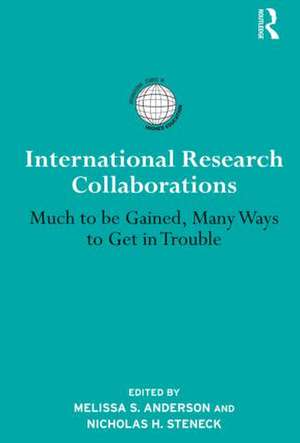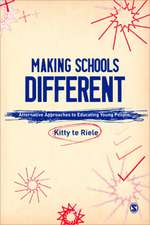International Research Collaborations: Much to be Gained, Many Ways to Get in Trouble: International Studies in Higher Education
Editat de Melissa S. Anderson, Nicholas H. Stenecken Limba Engleză Paperback – 28 noi 2012
Unfamiliar approaches to training, legal and regulatory complications, and differences in funding and administration pose challenges for collaboration that are then compounded by the need to satisfy the requirements of different research systems. To help today’s international researchers create the best possible partnerships, chapters by funding officers, diplomats, attorneys, publishers, regulators, graduate students and postdocs, industry researchers, administrators, and scholars of responsible research address the following key trouble spots:
- how research is organized and funded
- the legal and normative environments of research
- differences in regulation and oversight
- variation in graduate education and postdoctoral training.
| Toate formatele și edițiile | Preț | Express |
|---|---|---|
| Paperback (1) | 481.81 lei 6-8 săpt. | |
| Taylor & Francis – 28 noi 2012 | 481.81 lei 6-8 săpt. | |
| Hardback (1) | 1274.77 lei 6-8 săpt. | |
| Taylor & Francis – 8 iul 2010 | 1274.77 lei 6-8 săpt. |
Din seria International Studies in Higher Education
- 8%
 Preț: 389.63 lei
Preț: 389.63 lei -
 Preț: 481.38 lei
Preț: 481.38 lei -
 Preț: 417.81 lei
Preț: 417.81 lei -
 Preț: 478.33 lei
Preț: 478.33 lei - 14%
 Preț: 318.90 lei
Preț: 318.90 lei -
 Preț: 402.66 lei
Preț: 402.66 lei -
 Preț: 479.47 lei
Preț: 479.47 lei -
 Preț: 489.03 lei
Preț: 489.03 lei -
 Preț: 424.17 lei
Preț: 424.17 lei -
 Preț: 465.85 lei
Preț: 465.85 lei -
 Preț: 482.35 lei
Preț: 482.35 lei -
 Preț: 321.08 lei
Preț: 321.08 lei -
 Preț: 393.05 lei
Preț: 393.05 lei -
 Preț: 487.75 lei
Preț: 487.75 lei -
 Preț: 478.41 lei
Preț: 478.41 lei -
 Preț: 481.05 lei
Preț: 481.05 lei -
 Preț: 420.90 lei
Preț: 420.90 lei -
 Preț: 400.01 lei
Preț: 400.01 lei -
 Preț: 453.89 lei
Preț: 453.89 lei -
 Preț: 479.47 lei
Preț: 479.47 lei -
 Preț: 482.35 lei
Preț: 482.35 lei -
 Preț: 422.59 lei
Preț: 422.59 lei - 17%
 Preț: 258.50 lei
Preț: 258.50 lei -
 Preț: 479.69 lei
Preț: 479.69 lei - 18%
 Preț: 1004.38 lei
Preț: 1004.38 lei -
 Preț: 420.69 lei
Preț: 420.69 lei
Preț: 481.81 lei
Nou
Puncte Express: 723
Preț estimativ în valută:
92.20€ • 100.12$ • 77.45£
92.20€ • 100.12$ • 77.45£
Carte tipărită la comandă
Livrare economică 22 aprilie-06 mai
Preluare comenzi: 021 569.72.76
Specificații
ISBN-13: 9780415530323
ISBN-10: 0415530326
Pagini: 312
Dimensiuni: 156 x 234 x 17 mm
Greutate: 0.44 kg
Ediția:1
Editura: Taylor & Francis
Colecția Routledge
Seria International Studies in Higher Education
Locul publicării:Oxford, United Kingdom
ISBN-10: 0415530326
Pagini: 312
Dimensiuni: 156 x 234 x 17 mm
Greutate: 0.44 kg
Ediția:1
Editura: Taylor & Francis
Colecția Routledge
Seria International Studies in Higher Education
Locul publicării:Oxford, United Kingdom
Cuprins
Part I. International Research Collaborations
1. What Can Be Gained and What Can Go Wrong in the Context of Different National Research Environments, Melissa S. Anderson
2. Research Integrity in the Context of Global Cooperation, Nicholas H. Steneck
3. Considerations Upon Setting Out to Collaborate Internationally, F. Gray Handley
Part II. Differences in the Organization and Funding of Research
4. National Variations in the Organization of Scientific Research, David W. Chapman, Ingo Stolz, and Olena Glushko
5. Evolution of National Funding Systems for Research, Tony Mayer
6. National Systems for Scientific Research in China, Ping Sun
Part III. Differences in Legal and Normative Environments
7. Legal and Regulatory Considerations in International Research Collaborations, Mark A. Bohnhorst, Meredith McQuaid, Stacey R. Bolton Tsantir, Donald M. Amundson, and Melissa S. Anderson
8. The Governance of Scientific Collaborations: The International Reach of U.S. Law, Alexander M. Capron
9. Normative Environments of International Science, Raymond G. De Vries, Leslie M. Rott, and Yasaswi Paruchuri
Part IV. Differences in Regulatory and Publication Oversight
10. International Cooperation to Ensure Scientific Integrity, Christine C. Boesz and Peggy L. Fischer
11. Scientific Integrity in the Context of Pan-European Cooperation, Andrew C. Stainthorpe
12. Collaborating with Colleagues in Latin America: Publication Issues, Herbert Stegemann, Juan Miyahira, Sergio Alvarado-Menacho, and Reyna M. Durón
Part V. Differences in Graduate Education and Postdoctoral Training
13. Differences in National Approaches to Doctoral Education: Implications for International Research Collaborations, Melissa S. Anderson, Felly Chiteng Kot, Yiyun Jie, Takehito Kamata, Aliya Kuzhabekova, Christine C. Lepkowski, Marta A. Shaw, Martha M. Sorenson, and Sonia M. R. Vasconcelos
14. The Emergence of International Postdoctoral Training, John B. Godfrey
15. Preparing Students to Navigate Cross-National Differences in the Research Environment: The Role of Research-Integrity Education, Elizabeth Heitman and JuLeigh Petty
Part VI. Toward Successful International Research Collaborations
16. Proactive and Reactive Approaches to Facilitating International Collaborations, Camille Nebeker
17. Balancing Research Collaborations with the Realities of Working with Industry: Lessons from the Biotechnology Realm, Stewart Lyman
18. Realizing Gains and Staying Out of Trouble, Melissa S. Anderson and Nicholas H. Steneck
Appendix
Egypt, Interview with Ibrahim Adib Abdel-Messih
India, Prem Pais, Denis Xavier, and Kumar G. Belani
Singapore and China, Interview with James O. Leckie, Toward Successful International Research Collaborations
Contributor Biographies
1. What Can Be Gained and What Can Go Wrong in the Context of Different National Research Environments, Melissa S. Anderson
2. Research Integrity in the Context of Global Cooperation, Nicholas H. Steneck
3. Considerations Upon Setting Out to Collaborate Internationally, F. Gray Handley
Part II. Differences in the Organization and Funding of Research
4. National Variations in the Organization of Scientific Research, David W. Chapman, Ingo Stolz, and Olena Glushko
5. Evolution of National Funding Systems for Research, Tony Mayer
6. National Systems for Scientific Research in China, Ping Sun
Part III. Differences in Legal and Normative Environments
7. Legal and Regulatory Considerations in International Research Collaborations, Mark A. Bohnhorst, Meredith McQuaid, Stacey R. Bolton Tsantir, Donald M. Amundson, and Melissa S. Anderson
8. The Governance of Scientific Collaborations: The International Reach of U.S. Law, Alexander M. Capron
9. Normative Environments of International Science, Raymond G. De Vries, Leslie M. Rott, and Yasaswi Paruchuri
Part IV. Differences in Regulatory and Publication Oversight
10. International Cooperation to Ensure Scientific Integrity, Christine C. Boesz and Peggy L. Fischer
11. Scientific Integrity in the Context of Pan-European Cooperation, Andrew C. Stainthorpe
12. Collaborating with Colleagues in Latin America: Publication Issues, Herbert Stegemann, Juan Miyahira, Sergio Alvarado-Menacho, and Reyna M. Durón
Part V. Differences in Graduate Education and Postdoctoral Training
13. Differences in National Approaches to Doctoral Education: Implications for International Research Collaborations, Melissa S. Anderson, Felly Chiteng Kot, Yiyun Jie, Takehito Kamata, Aliya Kuzhabekova, Christine C. Lepkowski, Marta A. Shaw, Martha M. Sorenson, and Sonia M. R. Vasconcelos
14. The Emergence of International Postdoctoral Training, John B. Godfrey
15. Preparing Students to Navigate Cross-National Differences in the Research Environment: The Role of Research-Integrity Education, Elizabeth Heitman and JuLeigh Petty
Part VI. Toward Successful International Research Collaborations
16. Proactive and Reactive Approaches to Facilitating International Collaborations, Camille Nebeker
17. Balancing Research Collaborations with the Realities of Working with Industry: Lessons from the Biotechnology Realm, Stewart Lyman
18. Realizing Gains and Staying Out of Trouble, Melissa S. Anderson and Nicholas H. Steneck
Appendix
Egypt, Interview with Ibrahim Adib Abdel-Messih
India, Prem Pais, Denis Xavier, and Kumar G. Belani
Singapore and China, Interview with James O. Leckie, Toward Successful International Research Collaborations
Contributor Biographies
Notă biografică
Melissa S. Anderson, PhD., is Professor of Higher Education and an affiliate faculty member in bioethics at the University of Minnesota, where she also chairs the University’s Senate Research Committee.
Nicholas H. Steneck, PhD., is Director of the Research Ethics and Integrity Program of the Michigan Institute for Clinical and Health Research and Professor Emeritus of History at the University of Michigan.
Nicholas H. Steneck, PhD., is Director of the Research Ethics and Integrity Program of the Michigan Institute for Clinical and Health Research and Professor Emeritus of History at the University of Michigan.
Descriere
Part of the International Studies in Higher Education series, International Research Collaborations considers what can go wrong in cross-national collaborations, and how scientists can avoid these problems.










